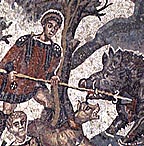 The Roman Military Diet By R.W. Davies
The Roman Military Diet By R.W. Davies
"We've been led to think that ancient Romans were mainly vegetarian and that when the legions came into contact with the European barbarians they had trouble stomaching the meat-rich food. "
"...there is evidence from the Republican period of Roman history for meat consumption by soldiers: "When Scipio reintroduced military discipline to the army at Numania in 134 B.C., he ordered that the only way the troops could eat their meat was by roasting or boiling it." Q. Caecilius Metellus Numidicus made a similar rule in 109 B.C."
In a related discussion, D.C. Reynolds points out, "The tradition about the legions being near vegetarian in camp is very believable for the early Republican era. Scurvy references are reliable, I believe. By the latter half of the 2nd century B.C., the whole Roman world had opened up and almost all aspects of Roman life, including diet, had changed from the 'old days.' My only real point is that Josephus and Tacitus could not accurately chronicle the early or middle Republican diet. Cato is the only source that comes close, and he is at the very end of the era (and a cabbage freak to boot)."
I didn't know Cato the Younger was so fond of cabbage. That may have accounted for his aversion to eating flesh during his "March of the 10,000" as recounted by Colleen McCullough in "The October Horse".
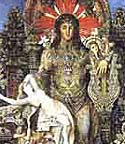 By Jesse Benedict Carter [1906]
By Jesse Benedict Carter [1906]
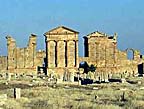 THE URBAN TRANSITION IN THE MAHGREB by Stephen Roskams, University of York
THE URBAN TRANSITION IN THE MAHGREB by Stephen Roskams, University of York
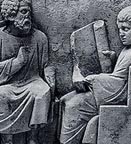 "To the extent that circumstance allowed, the Aeneid was used as a negative compositional model for the Bellum Civile. Lucan skillfully adapts (often by inversion or negation) the traditional elements of the genre to his new, 'anti-epic' purpose. Throughout the poem, the challenge of stylistic innovation called for in the narration of the nefas (wickedness) of civil war is forcefully met."
"To the extent that circumstance allowed, the Aeneid was used as a negative compositional model for the Bellum Civile. Lucan skillfully adapts (often by inversion or negation) the traditional elements of the genre to his new, 'anti-epic' purpose. Throughout the poem, the challenge of stylistic innovation called for in the narration of the nefas (wickedness) of civil war is forcefully met."
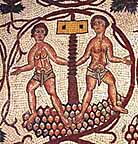 "The
"The  The Mabee-Gerrer Museum will be the only venue in the United States to feature the exhibit 'Unveiling Ancient Mystery: Etruscan Treasures.' It will be in Shawnee, Oklahoma from June 1 through Oct. 31, 2004, before heading back to the Vatican in Rome.
The Mabee-Gerrer Museum will be the only venue in the United States to feature the exhibit 'Unveiling Ancient Mystery: Etruscan Treasures.' It will be in Shawnee, Oklahoma from June 1 through Oct. 31, 2004, before heading back to the Vatican in Rome.
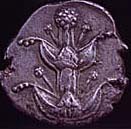 By David W. Tschanz
By David W. Tschanz
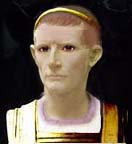 I am still listening to Harold Lamb’s biography of Hannibal and was surprised that he considered the Roman “liberation” of Greece by Titus Quinctius Flamininus and the resulting power vacuum that was created when the legions withdrew after defeating Philip V of Macedon at the battle of Cynoscephalae, an intentional ploy by the Romans to lure Antiochus III into a confrontation. He indicated Hannibal recognized it as a trap and tried to warn Antiochus but the great king did not listen to him.
I am still listening to Harold Lamb’s biography of Hannibal and was surprised that he considered the Roman “liberation” of Greece by Titus Quinctius Flamininus and the resulting power vacuum that was created when the legions withdrew after defeating Philip V of Macedon at the battle of Cynoscephalae, an intentional ploy by the Romans to lure Antiochus III into a confrontation. He indicated Hannibal recognized it as a trap and tried to warn Antiochus but the great king did not listen to him.
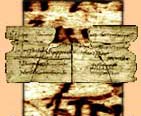 In "Letters From The Roman Front", a program on the Discovery Channel, the discovery of correspondence written on thin pieces of wood was considered the most important of all the items recovered at the site because these letters provided first hand accounts of daily life in that period of the Roman Empire. Now, scholars have translated the documents and provided their text in its entirety online for everyone to read and study. What a wonderful resource.
In "Letters From The Roman Front", a program on the Discovery Channel, the discovery of correspondence written on thin pieces of wood was considered the most important of all the items recovered at the site because these letters provided first hand accounts of daily life in that period of the Roman Empire. Now, scholars have translated the documents and provided their text in its entirety online for everyone to read and study. What a wonderful resource.